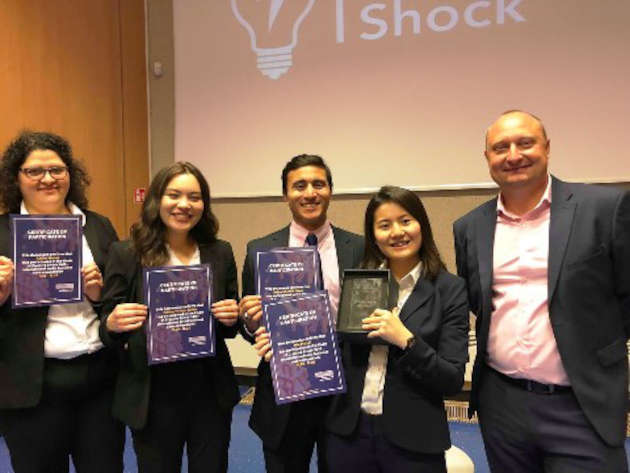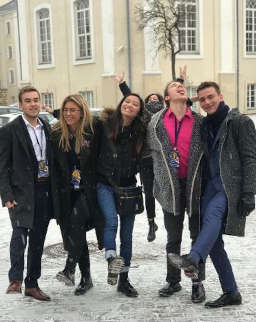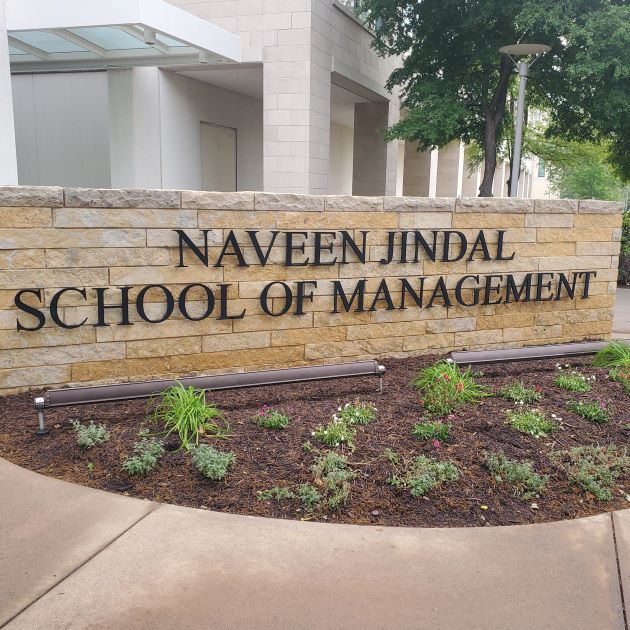
A team of four senior students from the Naveen Jindal School of Management took third place honors at Creative Shock, an international social business case competition held in Vilnius, Lithuania. The team was one of two from UT Dallas to advance to the finals on Dec. 1 by placing in the top 10 in preliminary competition.
Team Temoxicilin, which placed third, included Arjun Daru, a global business major; Kimberly Killen, a global business and supply chain management major; Nhi Lai, an information technology and systems major; and Karina Nunez, a supply chain management major.
Team Jace Nations was comprised of freshman and sophomore students, including Jace Nations, a global business and international political economy sophomore; Bruce Magness, an international political economy sophomore in the School of Economic, Political and Policy Sciences; Lourdes Buksh, a finance freshman; and Shay Smith, a biochemistry major in the School of Natural Sciences and Mathematics.
Creative Shock was established in 2011 at ISM University of Management and Economics in Lithuania. Participants gather to solve real-life business, marketing and public relations problems for social enterprises and organizations. Social businesses are those created and designed to address a social problem. The event this year attracted more than 1,700 students from around the world. It is the first year the competition was expanded to include the United States. JSOM’s students were the only U.S. teams to reach the finals.
In preliminary competition, students had one week to solve two social business issues. The first challenge was to research different regions in Africa to identify the best locations for expansion by a fictitious company in Africa. The students stayed up all night to create their presentation.
They also were asked to create videos that promote the mission of two real companies, Stand 4 Socks, which benefits the homeless population, and Anksti, a Lithuanian company that provides information about the care of premature babies and offers specialized products for them.
“For Anksti, we did an unconventional campaign idea to put silicone [baby dolls] in incubators and place them on a rotating basis at different locations around the city, in order to raise awareness of the problem of caring for premature babies,” said Kimberly Killen.

At the finals competition, students were required to solve two cases. The first focused on the financial impact or social impact of a drug that helps with opioid abuse. The second was about the business and social impact of a local pancake house that only hires people with mental disabilities, including financial, legal, cultural (stigma), skills, marketing and growth/impact challenges.
“This competition provides opportunities for learning real-life problem-solving and analytical skills,” said Hubert Zydorek, director of the BS in Global Business program and of the Center for Global Business. “These were tough questions that required thinking on your feet.”
Team Temoxicilin member Karina Nunez described the trip to Lithuania and the competition as a personal benchmark. “I tend to doubt my attributes,” she said, “but I saw all these talented people from around the world, and I saw that our abilities are pretty close to theirs.”
Because the students were used to having more time to complete projects, time management proved to be a big challenge during the competition, Nunez added.
Seeing the other presentations in the competition was a learning opportunity for Kimberly Killen. “It wasn’t that our ideas were bad — they were actually pretty good — but our presentation needed to be better,” she said. “If we had won with our presentation, I think we would have continued doing presentations the same way. This way, we learn from our mistakes.”
The experience had an effect of the way Arjun Daru thinks about his future career. “One of the things I learned was the importance of finding a career that gives you a sense of purpose,” he said.
For Bruce Magness, the lesson was the importance of using what you learn in class out in the world. “The things you learn in the business, economics or math classes don’t mean anything unless you know how to use them,” he said, “and applying them to real-life issues is the best way to learn.”
The conference and competition also provided valuable networking opportunities with students from around the world, as well as business leaders and officials, including Arnoldas Pranckevičius, head of European Commission Representation in Lithuania, and keynote speaker Mick Jackson. He is founder and CEO of WildHearts Group, a Glasgow, Scotland-based company working to alleviate poverty through compassionate entrepreneurship.
“Taking part in this competition aligns well with JSOM’s mission and UT Dallas’ strategic plan of engaging in a global society and providing global experiences for students,” Zydorek said.





